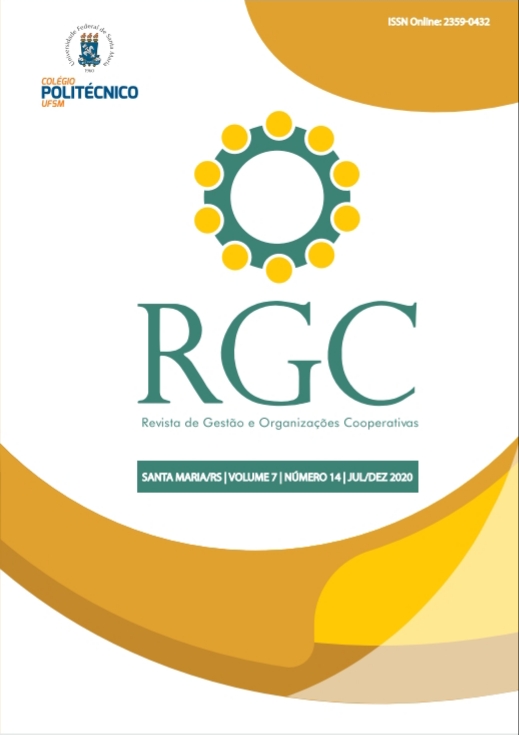Habitational cooperativism and collective property management as a guarantee of security of the possession of vulnerable populations? The Community Land Trust
DOI:
https://doi.org/10.5902/2359043241172Keywords:
Cooperativism. Community Land Trust. security in possession. self-management and sustainabilityAbstract
Community Land Trusts is an established model to protect the permanence of vulnerable communities in territories. The figure comes in the United States in the 1960s, tied to civil rights movements and the population living in rural areas. This article will evaluate the potential and limits of the application of the Community Land Trust instrument in Brazil from a qualitative approach and using the analysis of existing bibliographic and documentary content on the topic. The CLT instrument, as it requires collective territorial management, incorporates contemporary self-management elements and practices in housing cooperatives, showing itself to be the model that best represents values such as mutual aid, democracy, equality and solidarity and whose use is adapted to the needs of vulnerable populations.
Downloads
References
ALGOED, Line et al. Community Land Trusts and Informal Settlements: Assessing the feasibility of CLT instruments developed by the Caño Martin Peña communities in Puerto Rico for Favelas in Rio de Janeiro. Lincoln Institute of Land Policy Working Paper. Disponível em: https://www.lincolninst.edu/pt-br/publications/articles/community-land-trusts-rios-favelas. Acesso em 02 de out. 2019.
BARAVELLI, José Eduardo. O Cooperativismo Uruguaio na Habitação Social de São Paulo: Das cooperativas FUCVAM à Associação de Moradia Unidos de Vila Nova Cachoeirinha. Dissertação apresentada ao programa de Pós-Graduação da FAU/USP. São Paulo: 2006. Acesso em: http://labhab.fau.usp.br/biblioteca/teses/baravelli_mestrado_cooperativismo.pdf
BORBA, José Edwaldo Tavares. Direito Societário. 17. edição. São Paulo: Atlas, 2019.
BRASIL. Lei n. 5764, de 16 de dezembro de 1971. Disponível em http://www.planalto.gov.br/ccivil_03/LEIS/L5764.htm. Acesso em: 10 de mar. 2020.
CARDOSO, Patrícia. Sistema nacional de habitação de interesse social à luz do novo marco legal urbanístico: subsídios para implementação nos estados e municípios : lei federal nº 11.124/05 / [Patrícia Cardoso, Paulo Romeiro]. – São Paulo: Instituto Pólis, 2008. Disponível em: http://www.bibliotecadigital.abong.org.br/bitstream/handle/11465/380/POLIS_sistema_nacional_habita%C3%A7%C3%A3o_interesse_social.pdf?sequence=1&isAllowed=y
DAVIS, John Emmeus. The Community Land Trust Reader. Massachussets: Lincoln Institute of Land Policy, 2010.
DAVIS e Jacobus, R. The city-CLT partnership: municipal support for community land trusts. Cambridge: Lincoln Institute of Land Policy, 2008.
GUTTMANN, Robert. Uma introdução ao capitalismo dirigido pelas finanças. Novos Estudos – CEBRAP, São Paulo, n. 82, p. 11-33, nov. 2008.
HARVEY, David. A justiça social e a cidade. São Paulo: Hucitec, 1980.
HARVEY, David. A produção capitalista do espaço. São Paulo: Annablume, 2005.
HARVEY, David. O enigma do capital e as crises do capitalismo. São Paulo: Boitempo, 2011.
HARVEY, David. Os limites do capital. São Paulo: Boitempo, 2015.
KLINK, Jeroen; SOUZA, Marcos Barcellos de. Financeirização: conceitos, experiências e a relevância para o campo do planejamento urbano brasileiro. Cad. Metrop., São Paulo , v. 19, n. 39, p. 379-406, Aug. 2017 . Disponível em http://www.scielo.br/scielo.php?script=sci_arttext&pid=S2236-99962017000200379&lng=en&nrm=iso. Acesso em 25 de março de 2020.
LAGO, Luciana (org). Autogestão habitacional no Brasil: utopias e contradições. Rio de Janeiro: Letra Capital, 2012
MIRAFTAB, Faranak. Insurgent Planning: Situating Radical Planning in the Global South. In: Planning Theory 8(1), 2009. Disponível em: http://plt.sagepub.com. Acesso em 25 de julho de 2019.
MIRAFTAB, Faranak. Insurgência, planejamento e a perspectiva de um urbanismo humano. In: Revista Brasileira de Estudos Urbanos e Regionais – Recife, v.18, n.3, p.363-377, 2016.
NAHOUM, Benjamín. Algunas claves. Reflexiones sobre aspectos esenciales de la vivienda cooperativa por Ayuda Mutua, Ediciones Trilce, Montevideo, 2013.
KRUPPA, Sonia Maria Portella; GONÇALVES, Alicia Ferreira; MACDONALD, José Brendan. (et alli). Regime Jurídico das Cooperativas Populares e Empreendimentos em Economia Solidária. Série Pensando o Direito, vol. 46. Brasília: Ministério da Justiça, 2012.
RAFFO, Alberto; FRANCO, Jorge. La utopia realizable de la “propriedad colectiva”. In.: La vivienda, entre el derecho y la mercancía: las formas de propiedad en ... Regional de Vivienda y Hábitat, WE Effect, Centro Cooperativo Sueco, 2014.
RODRIGUES, Fania. Legado da Revolução Mexicana é base da política de Obrador para campo. O vermelho. Disponível em: http://www.vermelho.org.br/noticia/313709-1. Acesso em 20 de novembro de 2018.
THADEN, E e LOWE, J. Residents and community engagement in Community Land Trusts. Cambridge: Lincoln Institute of Land Policy, 2014.
VAINER, Carlos B. Pátria, empresa e mercadoria: notas sobre a estratégia discursiva do planejamento estratégico urbano. In: ARANTES, Otília; VAINER, Carlos; MARICATO, Ermínia. A cidade do pensamento único. Petrópolis: Vozes, 2000.
Downloads
Published
How to Cite
Issue
Section
License
Authors who publish in this journal agree to the following terms:
- Authors retain copyright and grant the journal the right of first publication, with work simultaneously licensed under the Creative Commons Attribution License that allows the sharing of work with acknowledgment of authorship and initial publication in this journal.
- Authors are authorized to enter additional contracts separately for non-exclusive distribution of the version of the work published in this journal (eg, publishing in institutional repository or as a book chapter), with acknowledgment of authorship and initial publication in this journal.
- Authors are allowed and encouraged to post and distribute their work online (eg, in institutional repositories or on their personal page) at any point before or during the editorial process, as this can bring about productive change as well as increase impact and impact. citation of published work (See The Effect of Free Access).







